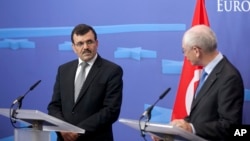LONDON —
The head of the European Commission has called on Tunisia Prime Minister Ali Larayedh to reform the country's criminal laws to give equality to all. Feminist activists helped draw attention to the Tunisian situation during Larayedh’s visit to Brussels.
Topless female activists called out “Stop the Repression” as a Tunisian delegation drove from European Union headquarters.
Another two women climbed on top of the motorcade before being dragged off by security officials.
The activists are from the group Femen. Earlier this month, three members of the group were jailed in Tunisia for staging a protest in support of a detained Tunisian feminist.
European Commission head Jose Manuel Barroso spoke Tuesday at a joint press conference with Larayedh.
Barroso said the European Union is calling for a reform of laws inherited from the previous regime, particularly in the criminal code, to ensure freedom of speech for Tunisian men and women.
Tunisia’s justice system, he said, should be overhauled to ensure its independence and impartiality so the country can achieve a “full and deep democracy”.
Tunisia has long had some of the most liberal laws on women’s rights in the Arab world. But women’s freedoms have been under the spotlight since a revolution in 2011. Tunisia's government, led by the moderate Islamist Ennahda Party, has had to deny allegations that women’s rights are at risk.
Lisa Watanabe from the Center for Security Studies in Zurich, Switzerland, said no concrete steps have been taken to roll back women’s rights, but sometimes debate goes in that direction.
“There was a proposition made by some members of parliament that belong to the major party within the coalition to include a clause in the constitution that they were complimentary, rather than equal to men, in terms of family life,” said Watanabe.
That clause, she said, was dropped because of a public outcry.
Regardless, she said the European Union has little influence over the inner workings of Tunisia’s justice system.
“Tunisia does have an association agreement with the European Union, so in terms of putting pressure on Tunisia, it may have some degree of influence in terms of demanding some conditionality to funding, but I do not think it can put a great deal of pressure on the government, to be frank,’ said Watanabe.
On Wednesday, an appeals hearing is set to take place in Tunisia for the European Femen activists. They all have been sentenced to four months in jail.
Topless female activists called out “Stop the Repression” as a Tunisian delegation drove from European Union headquarters.
Another two women climbed on top of the motorcade before being dragged off by security officials.
The activists are from the group Femen. Earlier this month, three members of the group were jailed in Tunisia for staging a protest in support of a detained Tunisian feminist.
European Commission head Jose Manuel Barroso spoke Tuesday at a joint press conference with Larayedh.
Barroso said the European Union is calling for a reform of laws inherited from the previous regime, particularly in the criminal code, to ensure freedom of speech for Tunisian men and women.
Tunisia’s justice system, he said, should be overhauled to ensure its independence and impartiality so the country can achieve a “full and deep democracy”.
Tunisia has long had some of the most liberal laws on women’s rights in the Arab world. But women’s freedoms have been under the spotlight since a revolution in 2011. Tunisia's government, led by the moderate Islamist Ennahda Party, has had to deny allegations that women’s rights are at risk.
Lisa Watanabe from the Center for Security Studies in Zurich, Switzerland, said no concrete steps have been taken to roll back women’s rights, but sometimes debate goes in that direction.
“There was a proposition made by some members of parliament that belong to the major party within the coalition to include a clause in the constitution that they were complimentary, rather than equal to men, in terms of family life,” said Watanabe.
That clause, she said, was dropped because of a public outcry.
Regardless, she said the European Union has little influence over the inner workings of Tunisia’s justice system.
“Tunisia does have an association agreement with the European Union, so in terms of putting pressure on Tunisia, it may have some degree of influence in terms of demanding some conditionality to funding, but I do not think it can put a great deal of pressure on the government, to be frank,’ said Watanabe.
On Wednesday, an appeals hearing is set to take place in Tunisia for the European Femen activists. They all have been sentenced to four months in jail.




